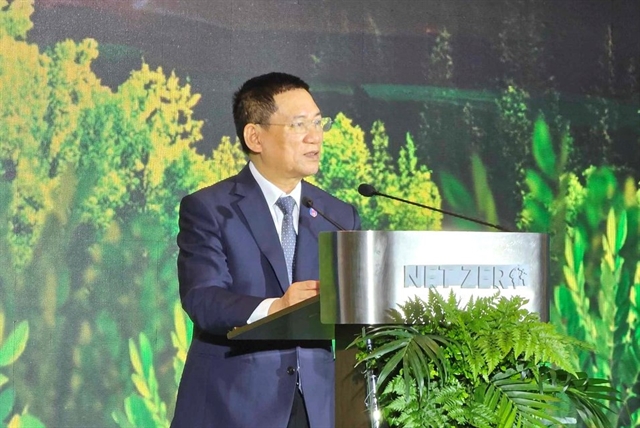Vietnamese firms need to meet net zero standards
Hoàng Đức Vượng, chairman of the Vietnam Recycled Plastics Association, said foreign firms are currently less interested in labour costs as they are getting clean energy and being able to exchange certificates of carbon credits when investing in Việt Nam.
 |
|
Minister of Finance Hồ Đức Phớc speaks at the event. The Ministry of Finance plans to officially bring the carbon credit certificate trading exchange into operation in 2028. Photo vietnamnet.vn |
HÀ NỘI — Net zero is a global game and Vietnamese firms need to quickly prepare to meet its standards so as not to miss, experts said.
Addressing a net zero seminar on Tuesday in Hà Nội, Hoàng Thái Sơn, director of the Ministry of Finance’s Legal Department, noted that Việt Nam is a major exporter to many developed markets, such as the US, the EU and Japan, which require firms to reduce carbon emissions.
Hoàng Đức Vượng, chairman of the Vietnam Recycled Plastics Association, said foreign firms are currently less interested in labour costs as they are getting clean energy and being able to exchange certificates of carbon credits when investing in Việt Nam.
Hervé Conan, director of the French Development Agency (AFD) in Việt Nam, said Việt Nam is currently one of the 20 largest carbon emitters in the world with CO2 emissions doubling in the past ten years. Energy levels and costs in the country are also greatly increasing. With an economic growth rate of 6-7 per cent, Việt Nam will be one of the world's largest carbon emitters.
Nguyễn Quốc Khánh, executive director of Vinamilk’s Research & Development (R&D), said the negative effects of climate change affect everyone, without exception. Therefore, Net Zero is not a luxury game for the rich, but a duty, responsibility, and right.
According to World Bank’s estimates, Việt Nam will likely need to invest an additional US$368 billion by 2040, or 6.8 per cent of GDP per year, as the country pursues a development path that combines resilience and zero carbon net emissions. The decarbonisation journey to meet international commitments accounts for about 30 per cent of resource needs.
Minister of Finance Hồ Đức Phớc said developing green financial and carbon markets are priorities that need to be implemented with a focus on developing green financial instruments, and sustainable finance; as well as encouraging localities and enterprises to issue green bonds and attracting institutional and individual investors to pour in green financial instruments.
In the coming time, the Ministry of Finance will continue to coordinate with the Ministry of Natural Resources and Environment and relevant agencies to develop a Prime Minister's decision on issuing a green classification list, which will be a basis for issuers to choose green projects to use capital from green bonds.
The development and implementation roadmap for the domestic carbon market has been also promulgated by the Government in Decree 06/2022/NĐ-CP regulations on the reduction of greenhouse gas emissions and protection of the ozone layer.
Accordingly, from now until the end of 2027, the Ministry of Finance will focus on building regulatory systems and policies to create a foundation for the market to operate, alongside establishing and organising a pilot operation of a carbon credit certificate trading exchange with an aim to officially operate the exchange in 2028.
According to Phớc, as well as having been assigned to preside over the development and establishment of a carbon credit certificate trading exchange, and issue a financial management mechanism for the operation of the carbon market, the Ministry of Finance is studying to develop a carbon market development project to submit to the Prime Minister for approval.
Deputy Minister of Planning and Investment Nguyễn Thị Bích Ngọc said her ministry is conducting research and developing a set of scientific criteria for national green classification, which is the basis for selecting investment projects and quantifying and assessing the progress of green growth.
Harmonising many factors, such as selecting green investment projects and mobilising domestic and international resources, will help quantify the progress of green growth. As a result, green projects will have conditions to access green finance and new preferential policies.
Ngọc expects details of areas and projects in line with green growth and international practices will be issued soon.








